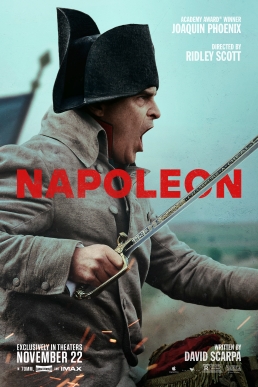As holiday entertainment goes, one could do worse than spend two-and-a-half hours (157 minutes) with Napoleon.

Wikipedia tells us: "Napoleon is a 2023 epic historical drama film directed and produced by Ridley Scott and written by David Scarpa. Based on the story of Napoleon Bonaparte, primarily depicting the French leader's rise to power as well as his relationship with his [first} wife, Joséphine, the film stars Joaquin Phoenix as Napoleon and Vanessa Kirby as Joséphine."
The many battle scenes are spectacular and have been praised for their accuracy.
One of the most spectacular battle reenactments in the film is during the final stages of the Battle of Austerlitz, described (elsewhere) in Wikipedia as follows:
"General panic seized the Allied army, and it abandoned the field in all possible directions. A famous episode occurred during this retreat: Russian forces that the French right had defeated withdrew south towards Vienna via the frozen Satschan ponds. French artillery pounded towards the men, and the ice was broken due to the bombardment. The men drowned in the cold ponds, dozens of Russian artillery pieces going down with them. Estimates of how many guns were captured differ: there may have been as few as 38 or more than 100. Sources also differ about casualties, with figures ranging between 200 and 2,000 dead. Many drowning Russians were saved by their victorious foes. However, local evidence later made public suggests that Napoleon's account of the catastrophe may have been exaggerated; on his instructions, the lakes were drained a few days after the battle and the corpses of only two or three men, with some 150 horses, were found. However, Tsar Alexander I confirmed the incident after the war."
Much of the movie is a love storey and here some poetic licence is taken: at the divorce, our hero slaps Joséphine (passionate but untrue); his mistress in Egypt is glossed over; and his second wife is hardly mentioned, although they were married for 11 years and had a good relationship. A number of their, many, biographers doubt that they were still 'in love' following their, separate, affairs with other lovers.
But for me, the main omissions were his many progressive political, legal and cultural reforms that are not, apparently, worth a mention.
True, his opposition to Church power and consequent secular reforms are briefly hinted at when he refuses to be crowned by the Church. But there is no mention of his abolition of Jewish Gettos in Venice and Rome, later reinstated by the Vatican, nor of his support for the introduction of the Metric System nor of the Code Napoléon, the civil code - reforms that are still in place today.
The movie is seen through (thru) an American lens. The British, (contemporaneously defending Canada against US aggression, in the war of 1812) do not fare well. Britain's most successful soldier: Viscount Arthur Wellesley, 1st Duke of Wellington, who had already defeated Napoleon's brother and generally routed the French in the Peninsular Wars (Spain and Portugal - a victory celebrated by Beethoven with his orchestral piece: Wellington's Victory - Opus 91) is briefly represented as a pompous incompetent.
Yet as we all know, it was he who prevailed at the Battle of Waterloo, initially against a superior force: "Prepare to Receive Cavalry!"; "Form Squares". But we didn't get to see or hear the famous Highland Piper, rallying the British on to victory.
Again, to quote Wikipedia (on the film):
"At the Battle of Waterloo in June, Napoleon, having amassed more troops, confronts the British army under the Duke of Wellington. French cavalry charges are repulsed by British infantry squares, and a desperate Napoleon urges his remaining soldiers forward, but this advance is decimated by re-formed lines of enemy infantry. The forces of Prussian Marshal Blücher arrive to reinforce Wellington, and the French are broken. As Napoleon retreats, he salutes Wellington.
Napoleon is exiled, this time to the island of Saint Helena in the middle of the Atlantic Ocean, and is seen bantering with children, writing his memoirs that would become a worldwide best-seller, and presenting to his listeners a version of history where he is always right.
Napoleon dies in 1821, hearing Joséphine beckon him to meet her again. An epilogue notes that roughly 3 million people died in the Coalition Wars (1792-1815)."
Despite it's imperfections, Wendy and I both enjoyed the film and have recommended it to our friends. After all, it's an entertainment not a documentary.
Needless to say, it's reported that French critics hated it.
